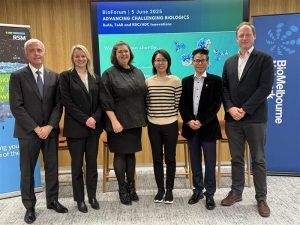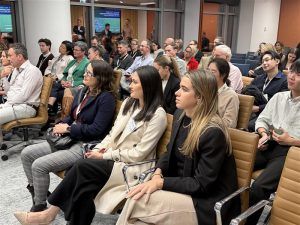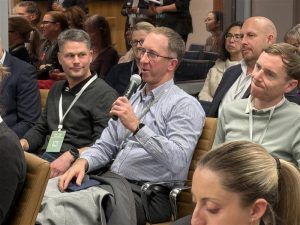Posted: 6 June 2025 This article summarises key insights from BioMelbourne Network’s BioForum, which brought together experts and participants to explore innovation, potential and challenges in complex biologics and radiopharmaceuticals. With around 90 participants in person and almost 100 joining online across the Asia-Pacific region, the event featured presentations from Dr Ying Li, Pro Bio; Dr Michael Wheatcroft, Telix Pharmaceuticals; and panel contributions from Prof Andrew Scott AM, Olivia Newton-John Cancer Research Institute; and Dr Jemery Wu, IDT Australia. Topics included Chemistry, Manufacturing, and Controls (CMC) development, targeted radiopharmaceuticals, clinical translation, and Australia’s growing capability in biomanufacturing. (4 mins read)
Strong industry interest and thought-provoking insights from sector experts
With almost 100 in-person attendees and around 140 participants joining online from across Australia and internationally, including from South Korea, Japan, Hong Kong, and Singapore the sold-out BioForum ‘Advancing challenging biologics’, delivered in partnership with ProBio, explored innovation and manufacturing challenges and solutions in complex biologics and radiopharmaceuticals. Kindly hosted by RSM Australia, the event attracted strong industry interest and delivered thought-provoking insights from some of the sector’s most experienced and forward-thinking leaders.
Opening the event, Karen Parr, BioMelbourne Network CEO, remarked on the strength and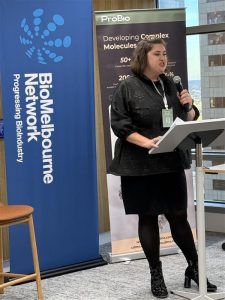 momentum of Victoria’s life sciences sector, emphasising the value of collaboration in accelerating translation from bench to bedside. She also highlighted that at the heart of BioMelbourne Network’s soon to be launched new Strategic Plan 2025-2028, was the commitment to cultivating a culture of connectivity, and learning. Events like this BioForum were exemplifying it, offering high-quality, thoughtful support, fostering a sector-ready workforce and a globally competitive Victorian health technologies ecosystem.
momentum of Victoria’s life sciences sector, emphasising the value of collaboration in accelerating translation from bench to bedside. She also highlighted that at the heart of BioMelbourne Network’s soon to be launched new Strategic Plan 2025-2028, was the commitment to cultivating a culture of connectivity, and learning. Events like this BioForum were exemplifying it, offering high-quality, thoughtful support, fostering a sector-ready workforce and a globally competitive Victorian health technologies ecosystem.
Exploring challenges and solutions in complex biologics
Dr Ying Li, Director of Biologics Process Development at ProBio, opened the speaker line-up with a comprehensive overview of the technical challenges in developing complex biologics such as bispecific and triSpecific antibodies, fusion proteins, and recombinant proteins. ProBio is offering end-to-end
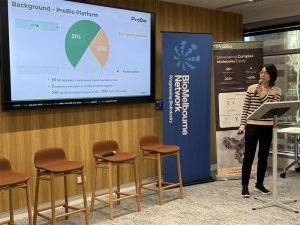
Contract Development and Manufacturing Organisation (CDMO) services from drug discovery to commercialisation, and has companies established in locations including in the US, the Netherlands, South Korea and China, and Dr Li shared strategic solutions from ProBio’s integrated CMC development platform. Dr Li provided deep insights into cell line optimisation, vector design, homodimer and aggregate control, and the use of AI-enhanced databases to improve manufacturability and product quality.
Her presentation highlighted how ProBio’s proprietary media and vector systems have achieved significant improvements in titer, purity, and stability, along with strategies to address common challenges in downstream processing. Case studies illustrated how innovative purification techniques and data-driven optimisation enable the company to support a diverse and expanding pipeline of complex biologics through to Good Manufacturing Process (GMP) scale-up and commercialisation.
Targeted radiopharmaceuticals – the challenges of scaling innovation
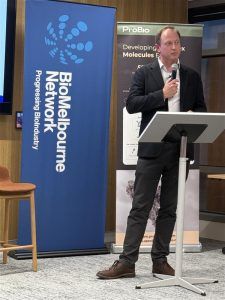 Dr Michael Wheatcroft, Chief Scientist at Telix Pharmaceuticals, followed with a compelling talk on the complexities and opportunities in the field of targeted radiopharmaceuticals (TRPs). He outlined the company’s unique position as a proudly Melbourne-headquartered and globally-operating leader in radiopharmaceutical imaging and therapy, with over 1,000 employees worldwide and growing manufacturing capacity across multiple regions.
Dr Michael Wheatcroft, Chief Scientist at Telix Pharmaceuticals, followed with a compelling talk on the complexities and opportunities in the field of targeted radiopharmaceuticals (TRPs). He outlined the company’s unique position as a proudly Melbourne-headquartered and globally-operating leader in radiopharmaceutical imaging and therapy, with over 1,000 employees worldwide and growing manufacturing capacity across multiple regions.
Drawing parallels with antibody-drug conjugates (ADCs), Dr Wheatcroft detailed the structural and operational intricacies of theranostic development from payload selection and pharmacokinetics to logistics and regulatory navigation. He noted that TRPs are highly perishable products with shelf lives measured in hours or days, requiring sophisticated planning and decentralised manufacturing networks. He also explored the formulation requirements for radio stability and strategies to optimise protein structure, conjugation chemistry, and global distribution.
Through visuals and technical depth, Dr Wheatcroft painted a clear picture of how radioisotope selection, pharmacology, and bioconjugation shape the future of precision oncology.
Insightful panel discussion with a focus on Australia’s growing capacity to lead
The panel discussion, chaired by Dr Lauren Pitt, Head of Preclinical, Myrio, brought together Dr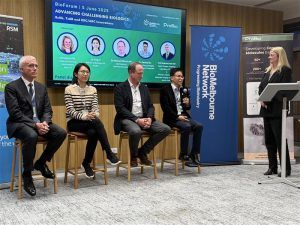 Jeremy Wu, Antibody Drug Conjugate Project Lead, IDT Australia, and Prof Andrew Scott AM, Head of Tumor Targeting Laboratory, Olivia Newton-John Cancer Research Institute, and Director, Department of Molecular Imaging and Therapy, Austin Health, who were joined by Dr Ying Li, and Dr Michael Wheatcroft. The conversation explored how emerging technologies are reshaping biotherapeutic development, with an emphasis on Australia’s growing capacity to lead in the ADC and TRP space.
Jeremy Wu, Antibody Drug Conjugate Project Lead, IDT Australia, and Prof Andrew Scott AM, Head of Tumor Targeting Laboratory, Olivia Newton-John Cancer Research Institute, and Director, Department of Molecular Imaging and Therapy, Austin Health, who were joined by Dr Ying Li, and Dr Michael Wheatcroft. The conversation explored how emerging technologies are reshaping biotherapeutic development, with an emphasis on Australia’s growing capacity to lead in the ADC and TRP space.
Dr Jemery Wu – deeper collaboration within the region encouraged
Dr Wu, whose career spans more than 20 years in bioconjugation, shared insights into Australia’s growing ecosystem. He encouraged deeper collaboration within the region to accelerate translation and improve sovereign capability in complex biologics.
Prof Scott, a globally recognised expert in molecular imaging and therapeutic antibody development, spoke to the evolving expectations and challenges in bringing bispecifics, ADCs, and radiopharmaceuticals into clinical use. Drawing on his dual perspective as both a scientist and a practising oncologist, he underscored the importance of translating promising preclinical results into meaningful clinical outcomes.
He highlighted the role of real-time imaging and pharmacokinetics in guiding trial design and highlighted the variability in how these complex biologics behave in humans compared to animal models. His reflections also emphasised Australia’s unique position as a global leader in early-phase clinical trials, bolstering by world-class talent, infrastructure, and regulatory pathways.
Dr Ying Li: No single template fits it all – need to evolve manufacturing platforms
Dr Ying Li reiterated that no single template fits all, and emphasised the need to evolve manufacturing platforms that accommodate fusion proteins, bsAbs, and novel conjugates, integrating flexibility, quality control, and tailored purification approaches.
Continued conversation during an engaged networking session
The formal discussion flowed seamlessly into the networking session. Vivid conversations continued among attendees spanning manufacturing innovations, clinical strategies, and future collaborations. With its highly engaged audience and strong international online participation, this BioForum was a timely and impactful exploration of the challenges and breakthroughs shaping the future of complex biologics and radiopharmaceuticals, also highlighting the potential of the development of complex biologic therapies and the need for Australia to advance them.
BioMelbourne Network thanks all speakers, panellists, participants and ProBio for their support, as well as RSM for generously hosting the event.
Stay connected. Please follow BioMelbourne Network on LinkedIn and subscribe to the fortnightly newsletter In the Loop to keep up with upcoming foras, insights, and sector opportunities.
